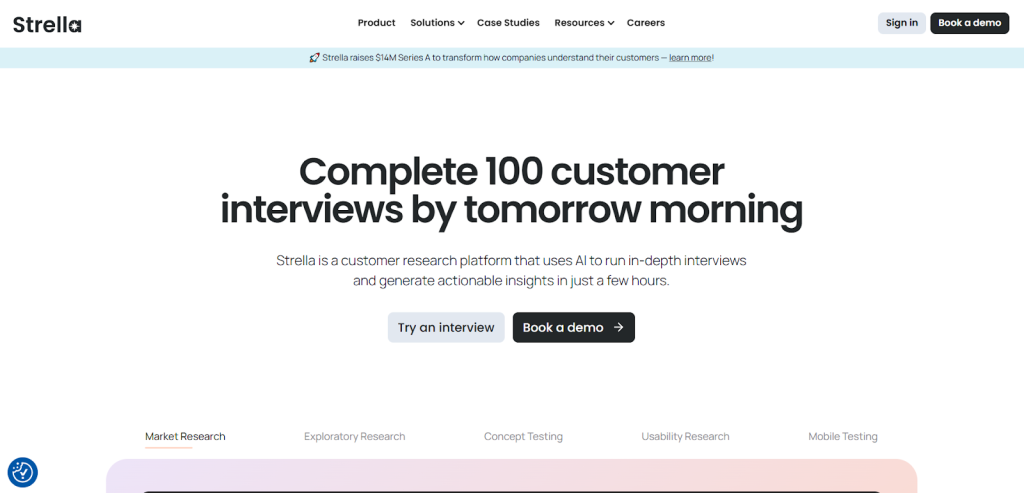Strella Raises $14M Series A to Turn Customer Research into Continuous Product Advantage
October 23, 2025
byFenoms Start-Up Research

Strella, the AI-powered customer research platform that transforms how companies uncover and act on customer insight, has raised $14 million in Series A funding. The round was led by Bessemer Venture Partners, joined by Decibel Partners, Future Backed Ventures, MVP Ventures, and 645 Ventures, fueling Strella’s mission to redefine qualitative research as an always-on engine for business intelligence.
Founded by Lydia Hylton and Priya Krishnan, Strella helps product, UX, and strategy teams move faster by automating the hardest parts of customer research. The platform uses AI to design and conduct interviews, recruit qualified participants from a global pool, and synthesize insights into clear, actionable recommendations-all within hours rather than weeks.
The speed of truth in a market that moves daily
Traditional customer research has long been a bottleneck. Interviews take weeks to organize, responses come too late, and insights get diluted before they ever reach the product roadmap. Strella’s model compresses that timeline, using adaptive interview flows and automated analysis to deliver deep qualitative learning at the pace modern teams operate.
Companies using Strella are no longer waiting for quarterly research cycles to understand users. Instead, they’re pulling fresh insights weekly and adjusting direction before problems metastasize. This ability-to hear, decide, and ship faster-isn’t just operationally efficient; it’s becoming existential.
When feedback cycles shorten, decision velocity increases. And this is where Strella’s significance extends far beyond customer research-it represents a fundamental rewiring of how startups learn.
Because at the root of every durable startup isn’t just execution-it’s learning per unit of time. The companies that survive turbulence are those that compress the gap between signal and action. That’s what Strella quietly enables: the ability to build in tight learning loops without adding headcount or cost.
Here’s the insight that sits beneath Strella’s model and that every founder should internalize: customer feedback isn’t a validation tool-it’s a calibration mechanism.
The fastest-growing startups don’t use customer research to confirm assumptions. They use it to refine instinct. They treat every conversation as a micro-adjustment to their internal compass, not as a scorecard of whether they’re “right.”
Most teams fall into the trap of researching until they find consensus. But the most effective founders use research to map the edge of what they don’t know. They push past the obvious answers-“people like our product”-and dig for the friction points, contradictions, and hesitations that reveal where true differentiation can occur.
Strella’s automation allows that kind of depth at scale. By lowering the cost and time required to gather nuanced feedback, it makes space for curiosity again. Founders can test more hypotheses, follow threads that might have been ignored, and uncover the subtle emotional or contextual signals that define real product-market fit.
This is the quiet compounding advantage: learning faster than your competitors means compounding insight faster than they can react. Every new piece of validated understanding feeds the next iteration, creating a flywheel of refinement that no amount of paid marketing can replicate.
Turning qualitative chaos into operational clarity
Under the hood, Strella uses generative AI models trained to interpret open-ended responses, detect emerging themes, and flag sentiment patterns. The result isn’t just data-it’s narrative clarity. Product managers receive highlight reels of interviews, tagged by topic and emotion, so that insight isn’t buried in transcripts but visible in story form.
Strella’s technology also recruits from diverse panels and integrates seamlessly with existing analytics stacks, ensuring both speed and representativeness. For companies expanding across markets, that global perspective turns research into a continuous system of listening.
As Hylton explained in a recent conversation, the vision is to “make it as easy to understand your customers qualitatively as it is to read your analytics dashboard.” That statement underscores Strella’s ultimate mission: to make human insight quantifiable, repeatable, and timely enough to influence every sprint.
Why investors are betting big on rapid-learning infrastructure
The $14 million Series A round validates a broader market shift toward real-time customer understanding. Venture firms like Bessemer and Decibel are investing not just in software efficiency but in learning efficiency. Companies are realizing that their ability to interpret customer signals-faster and more precisely than competitors-is now a core strategic moat.
With this capital, Strella plans to deepen its machine-learning capabilities, enhance integrations with tools like Notion and Figma, and grow its enterprise footprint across product-led organizations. The startup’s goal isn’t merely to accelerate research; it’s to transform it into a persistent, compounding learning system that continuously informs what gets built next.
The emerging category of continuous intelligence
In the evolving product ecosystem, static insights are no longer sufficient. Strella’s approach redefines research as continuous intelligence: a living process of gathering, interpreting, and applying customer context in near real time.
For founders, this marks an inflection point. The companies that win the next decade won’t just have better technology-they’ll have faster understanding. And the toolsets that collapse the distance between conversation and decision will quietly become the infrastructure that powers modern product leadership.Strella’s Series A isn’t just about scaling an AI tool; it’s about scaling curiosity. In an age when customer sentiment shifts overnight and feedback loops define survival, the founders who can listen, learn, and adapt the fastest will lead the next generation of enduring startups.









